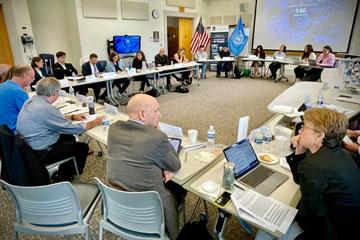On the 75th anniversary of the Geneva Conventions, 29 leading experts in the field of international humanitarian law (IHL) from around the world gathered at Case Western Reserve University School of Law to discuss whether there is a need to strengthen the Geneva Conventions to address the challenges of 21st century warfare, and how that could best be accomplished.

With a total of 196 state parties, there are no other international treaties as widely ratified as the four 1949 Geneva Conventions on the Laws of War, which constitute the cornerstone of IHL. But the venerable Geneva Conventions were concluded 75 years ago, and their two Additional Protocols of 1977 are nearly 50 years old. Although many of the rules are flexible enough to apply to changing times, the conventions were created before the age of the computer, space flight, the internet, artificial intelligence, and other modern technologies that have transformed the ways in which contemporary wars are fought.
The experts were in Cleveland to speak at a conference on the need to update the Geneva Conventions Sept. 27, organized by the law school’s Cox International Law Center, and co-sponsored by the U.S Red Cross and the American Branch of the International Law Association, of which Associate Dean Michael Scharf serves as president. The participating experts came from all parts of the globe, including Switzerland, The Netherlands, Germany, Columbia, Israel, Canada and the United States. They ranged from the regional legal adviser of the International Committee of the Red Cross to the legal adviser of the German Federal Ministry of Defense, and from the chief prosecutor of an international criminal tribunal to the former chief of operations of the U.S. Space Force. The keynote speaker was John Bellinger, the former legal adviser of the U.S. Department of State.
During the experts meeting chaired by Scharf on Sept. 26, the participants examined the need to update the Geneva Conventions in five areas.
“We focused on space warfare, cyber warfare, autonomous weapons systems, protection of the environment, and treatment of non-state actors,” said Scharf. “In addition, we discussed whether a new binding instrument is needed or whether it would be better to develop updated commentaries or a guide to best practices so that they can be distilled down to clear rules of engagement that can be trained and implemented by all parties to a conflict.”
The Report of the Cleveland Experts Meeting will be published along with articles written by the Conference speakers in Volume 57 (Spring 2025) of the Case Western Reserve Journal of International Law. The experts meeting was governed by the Chatham House Rule, which means the Cleveland Report will summarize the substance of the discussion but will not indicate the specific position taken by any of the participants.
“We hope the volume of our journal with the conference articles and Experts Meeting Report will be the catalyst for future work to update the law of war,” said Scharf.
Watch videos of the conference speeches and panels.
In addition, the need to update the Geneva Conventions was the subject of a recent episode of the law school’s radio program, “Talking Foreign Policy,” broadcast on Cleveland’s NPR station. Listen to the discussion.
